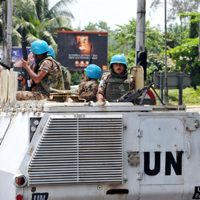The debate over humanitarian intervention has a way of calling forth unconditional answers to a question that ought to elicit subtle reflection: What responsibilities do citizens of some or all states have to those of another state who are suffering grave harm? Realists argue that, however tragic, such situations seldom if ever touch on the fundamental interests of other powers, and thus no response is justified. Anti-imperialists maintain that most of the outside powers that have the ability to intervene cannot do so justly or disinterestedly, for reasons of history and current political economy. Purists claim that interventions are not justified anywhere unless they are conducted everywhere that lives are threatened, while overeager humanitarians have been known to call for designated forces -- whether at the U.N., the EU, NATO or within national militaries -- so that the international community can do just that.
Since 2005, advocates of international action in the most extreme situations have had a new, universally agreed-upon U.N. norm on which to base their argument. The responsibility to protect (R2P), adopted by the General Assembly that year, commits each state to protecting its own population from "genocide, war crimes, ethnic cleansing and crimes against humanity" and to working through the U.N. to protect the populations of other states through peaceful and other means if their own governments fail to do so. The guiding spirits behind the R2P norm -- former Canadian Foreign Minister Lloyd Axworthy, former Australian Foreign Minister Gareth Evans and former Algerian Ambassador to the U.N. Mohamed Sahnoun -- have made it clear that their intention was not focused on a new moral absolute, but instead on increasing the likelihood of international action that would save lives. As Evans said in a May speech, "In the minds of those who initiated it, R2P was designed from the outset primarily to have political effect. The ICISS commissioners were concerned to build new doctrine on sound philosophical and legal foundations, but our overwhelming preoccupation was with stopping mass killing, raping, forced population shifts and property destruction."
The invocation of R2P in the Libya case -- first in Security Council Resolution 1970 (.pdf) to authorize a range of diplomatic, economic and judicial responses, and later in Resolution 1973 (.pdf) to authorize military actions -- has indeed had a range of political consequences, both in Washington and across the U.N. system and, therefore, the globe.

